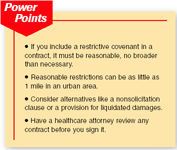Article
The end of restrictive covenants?
A state supreme court rules that "noncompete" clauses violate public policy by limiting patient access to medical care.
If you're hiring a new doctor-or if you're a job applicant yourself-the employment contract probably includes a "noncompete clause" or "restrictive covenant." This standard provision prevents the new doctor from practicing in the same geographic area for a specific time period after leaving the group.
Groups obviously favor restrictive covenants because they protect the group's patient base and its investment in recruiting and supporting the new physician. New associates, however, usually resent the clause, since it prevents them from earning a living in the same area if the job with the group doesn't work out.
Because of that inherent conflict, disputes over noncompete clauses often end up in court. A recent decision by the Tennessee Supreme Court highlights the continuing battle over these controversial contract provisions. Here's what happened in that case, plus what you need to know about dealing with restrictive covenants-no matter which side of the bargaining table you're sitting on.
When David Udom was hired by Murfreesboro Medical Clinic, a 50-doctor multispecialty group in Murfreesboro, TN, the internist's contract contained a typical noncompete clause that forbade him from practicing within 25 miles of the city for 18 months after leaving the clinic. The contract also contained a "buy-out" clause under which the restriction could be waived if he paid the clinic the equivalent of a year's salary, and reimbursed it for any moving expenses the clinic had paid on his behalf.
Udom signed the contract and began working at the clinic in September 2000. In August 2002, shortly before his two-year contract was about to expire, he was informed that it wouldn't be renewed, and that the noncompete clause would therefore take effect.

After consulting an attorney, Udom informed the clinic that despite the noncompete clause, he planned to open a solo practice in the town of Smyrna, about 15 miles from Murfreesboro. He also refused to pay the sum called for by the contract's buy-out option. The clinic responded by filing a complaint against him in state court, accusing him of violating the terms of the noncompete clause.
Following a hearing in January 2003, the judge declared the noncompete clause valid and binding, and issued a temporary injunction barring Udom from either opening a practice in Smyrna, or working at MTMC. The judge also ordered him to deposit $120,000 with the court to satisfy the buy-out clause, pending a resolution of the case. Udom took out a loan and made the deposit. But he appealed the ruling, and went ahead and opened his practice in Smyrna-with the court's permission. The appellate court later upheld the restrictive covenant, and the case ended up before the Tennessee Supreme Court.
In his brief, Udom argued that the covenant was unreasonable, overly broad, and "against public policy." In response, the clinic insisted that the covenant was legal and should be enforced to protect its patient base. Because of "the unique one-on-one relationship between a physician and patient," the clinic argued, many of Udom's patients might otherwise leave the group if he opened his own practice in the same area. The clinic also claimed a legitimate business interest in protecting its investment in Udom's recruitment, training, office space, and administrative support during his two-year employment.





